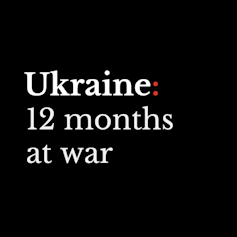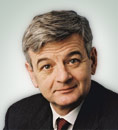Ukraine war: what the last 12 months has meant for the ordinary Russian soldier
If Vladimir Putin launches a new offensive in Ukraine this spring as expected, the key to its success or failure will be the ordinary Russian soldier.
Moscow has shown little consideration for these soldiers over the past 12 months. In February 2022 troops who were told that they were going on routine exercises instead found themselves fighting a war in Ukraine. Barely trained conscripts were sent into battle in defiance of Russia’s own laws.
Civilians with medical conditions that should disqualify them from military service were called up and put into uniform. And men mobilised for wartime service were told to bring their own medical supplies because of dire shortages at the front.
Ukrainians have found Russia’s soldiers to be everything from frightened teenagers who cry when they are captured, to men who brutally torture, rape and kill civilians and prisoners-of-war with no regard for the Geneva conventions. Russia’s soldiers have turned out to be very different from the formidable fighting force that many expected a year ago.

Since Vladimir Putin sent his war machine into Ukraine on February 24 2022, The Conversation has called upon some of the leading experts in international security, geopolitics and military tactics to help our readers understand the big issues.
Of course, the quality and quantity of manpower is only one of many factors that will shape the way that Russia continues to wage this war, including its commanders’ ability to adjust their tactics to compensate for the greater range and firepower of the weapons being supplied by Ukraine’s western supporters.
The degree of Russia’s success in replenishing its own supplies, particularly ammunition, will also be important in determining the intensity of attacks that Moscow is able to sustain against Ukrainian civilians and soldiers alike.
However Putin’s announcement in September 2022 of a “partial mobilisation” of 300,000 men for the armed forces suggests that Russia is planning to rely heavily on one of its traditional advantages in war: the ability to overwhelm the opponent by the sheer numbers of troops that it can put into the field.
But will Russia be able to continue to mobilise large numbers of its men to fight in this deadly war? Recent US estimates suggest that nearly 200,000 Russian soldiers have been killed or injured in Ukraine over the past year. The answer may lie in the complex relationship that Russians have with the armed forces.
Attitudes to military service
A poll conducted in November 2022 by the Levada Center, an independent and highly respected Russian research organisation, revealed that 49% of Russians surveyed agree that “every real man should serve in the army”.
Opinion polls never convey a perfect understanding of what people really think, and there are good reasons to be cautious about polling in Russia since it became illegal to protest against the war in Ukraine or to “discredit” the army. However, the Levada Center has been conducting this survey on a regular basis since 1997 and the results have been remarkably stable.
The consistency of these results over the past 25 years suggest that Putin is tapping into powerful cultural beliefs and social norms when he calls on hundreds of thousands of Russia’s men to risk their lives to fight in Ukraine.
But despite the widespread and longstanding nature of these attitudes towards the army and military service, before Putin’s September mobilisation announcement Russia struggled to recruit enough soldiers to replace its mounting losses in Ukraine, let alone carry out a strategy of overwhelming force.
The “people’s militias” in Russian-occupied Donetsk and Luhansk have had to resort to heavy-handed tactics to fill their ranks, amid reports that men in those territories injure themselves or pay bribes to avoid being sent into combat.
In 2022 the Russian ministry of defence attempted to meet the need for more soldiers by forming volunteer battalions. This effort achieved only limited success, despite the offer of salaries at up to ten times the local average for short-term contracts, and accepting applications from middle-aged men in their 40s and 50s.
It was also in the summer of 2022 that the infamous private military company Wagner Group was reduced to searching in Russia’s prisons for new recruits to fight in Ukraine. Convicts were offered generous salaries and a full pardon if they survived six months of combat, with payments promised to their families if they were killed.
This strategy filled the ranks for a time, but the flow of volunteers dried up as reports of the high casualty rates made their way back to prisons. In early February the head of Wagner Group Yevgeny Prigozhin announced that they would no longer seek new members among Russia’s convicts.
Tensions, anger and backlash
It is no wonder, then, that Putin hesitated to give the order for a general mobilisation, reportedly fearing a public backlash against the war and mass resistance to the call up.
And he was right to be concerned. While many men complied with their mobilisation orders – expressing precisely the views reflected in the Levada Center’s surveys – hundreds of thousands of others fled the country to avoid being sent to fight in Ukraine.
Demographic differences within Russian society help to explain the sharp divisions in these responses to mobilisation. The Levada survey revealed that people in the 18-24 age range, along with those who live in Moscow and the larger cities of Russia, are least likely to identify military service with being a “real man”. They are also most likely to agree with the statement that “military service is senseless and dangerous and should be avoided at all costs”.
But even men who view military service positively and are prepared to do their patriotic duty can still rebel when the state fails to keep its side of the bargain and prepare them adequately for war.
Newly mobilised soldiers complain about the lack of training and equipment they are given before facing combat. This dissatisfaction has led to angry confrontations between soldiers and their commanders. There are reports that soldiers are being punished for refusing to fight. And increasingly they are appealing to the women in their families to intercede with the ministry of defence on their behalf.
These tensions in the ranks have serious implications for morale. The contrast with the high levels of motivation among Ukrainian soldiers is striking.
One year on from the start of a military operation that Moscow was expected to win easily, there are increasing signs of anger, frustration and resistance from ordinary Russian soldiers. These are important reminders that these men are not mindless pawns who will do Putin’s bidding under any circumstances.
If Russia is to regain the initiative and the territory that it has lost in Ukraine over the past months, it first needs to regain the trust and goodwill of its soldiers. Whether Russia’s political and military leadership is capable of doing that is not clear.
Jennifer Mathers, Senior Lecturer in International Politics, Aberystwyth University
This article is republished from The Conversation under a Creative Commons license. Read the original article.



















